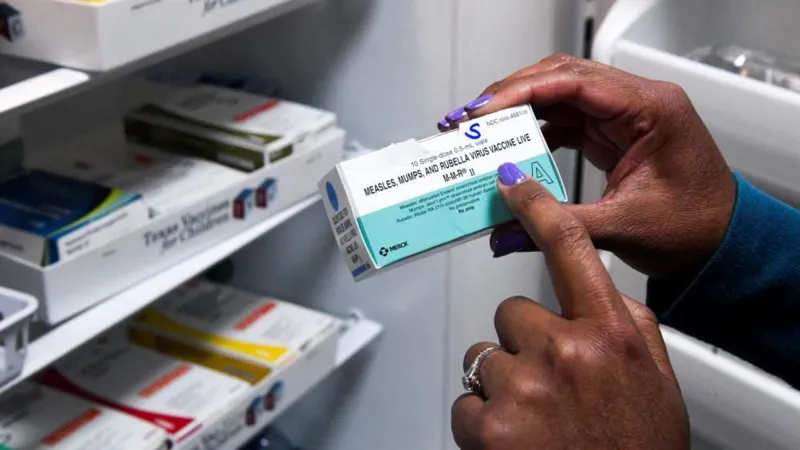In 2024, the number of measles cases in the European region doubled, reaching its highest level in 25 years, according to a joint report by the World Health Organization (WHO) and the United Nations Children’s Fund (UNICEF). This alarming resurgence of a disease once largely under control is a stark reminder of the vulnerabilities in global public health, especially concerning vaccination rates. With more than 40% of the reported cases occurring in children under the age of five, the impact of this uptick is particularly devastating for the youngest and most vulnerable members of society.
Measles, a highly contagious viral infection, was once a major cause of death and disability among children worldwide. Thanks to the widespread implementation of vaccines, particularly the measles, mumps, and rubella (MMR) vaccine, the incidence of measles had dramatically decreased, with the WHO and UNICEF leading global campaigns to eradicate the disease. However, the latest report signals a concerning reversal of this trend.
The sharp increase in measles cases in Europe is not just a regional issue but a global one. Measles can spread rapidly in communities with low vaccination rates, and Europe, with its diverse population and varying healthcare access, has experienced a particularly worrying spike. The number of cases doubled from 2023 to 2024, underscoring the need for urgent action to reverse this trend.
Measles Cases in the European Region Soar To The Highest Level In 25 Years: A Wake-Up Call For Vaccination
Hans Henri Kluge, WHO regional director for Europe, called the rise in measles cases a “wake-up call,” emphasizing that “without high vaccination rates, there is no health security.” This statement points to a critical issue: vaccination rates across many European countries have stagnated or even declined in recent years. The result has been a breakdown in herd immunity, which protects vulnerable populations from infectious diseases like measles.
Vaccination is one of the most effective tools in preventing the spread of contagious diseases. The MMR vaccine, which is highly effective in preventing measles, mumps, and rubella, is 97% effective in fighting off the dangerous virus. Despite this high efficacy rate, the global vaccination coverage has not kept pace with the growing need. When vaccine coverage drops below 95% – the threshold necessary for herd immunity – outbreaks become more likely.
One of the most troubling aspects of the current measles resurgence is the disproportionate impact on children under the age of five. According to the joint WHO-UNICEF report, children in this age group accounted for more than 40% of all measles cases reported in Europe and central Asia. This statistic highlights the critical role of early childhood vaccination in safeguarding the health of the youngest members of society.
Children under five are especially vulnerable to the complications of measles, which can lead to severe outcomes such as pneumonia, encephalitis (inflammation of the brain), and even death. Additionally, measles can cause long-term disabilities, such as blindness and hearing loss, making it a particularly devastating disease for young children. These children are also at risk of being infected by unvaccinated adults or those who received only a single dose of the MMR vaccine, which may not provide full protection.
The resurgence of measles cases in Europe is largely attributable to the growing issue of vaccine hesitancy and misinformation. Over the past few decades, a small but vocal group of anti-vaccine advocates has spread false claims about the safety of vaccines, often targeting social media platforms to amplify their messages. These efforts have led to a decline in vaccine uptake in many parts of Europe, particularly in countries like France, Italy, and Ukraine, where vaccine skepticism has been especially prevalent.
Despite overwhelming evidence that vaccines are safe and effective, the anti-vaccine movement has caused significant harm to public health. Misinformation surrounding the MMR vaccine, in particular, continues to circulate, with some claiming that the vaccine is linked to autism, a claim that has been thoroughly debunked by scientific research. The persistence of such falsehoods has contributed to a growing distrust in public health authorities and vaccines themselves, leading some parents to delay or forgo vaccinations for their children.
The resurgence of measles in Europe serves as a stark reminder of the importance of maintaining high vaccination coverage and investing in public health education. WHO and UNICEF have long advocated for universal access to vaccines, emphasizing the need for vaccination campaigns that reach the most vulnerable populations, including refugees, migrants, and those in low-income or rural areas. However, the recent spike in measles cases shows that there is still much work to be done in improving vaccine coverage and combating misinformation.
Governments and health organizations must strengthen their efforts to ensure that vaccines are accessible, affordable, and safe for everyone. This includes addressing the barriers that prevent people from getting vaccinated, such as limited access to healthcare, lack of awareness, and cultural or political factors that may discourage vaccination. Additionally, public health campaigns must focus on restoring trust in vaccines and providing accurate, evidence-based information to counteract the harmful influence of vaccine misinformation.
Measles knows no borders, and the resurgence of the disease in Europe is not just a European problem. It is a global health issue that requires international cooperation and solidarity to address. The world must work together to ensure that vaccines are distributed equitably and that all children, regardless of where they live, have access to life-saving immunizations.
WHO and UNICEF have emphasized that achieving global vaccine coverage is crucial not only for protecting individuals but also for ensuring global health security. Outbreaks in one region can easily spread to others, especially in an increasingly interconnected world. The recent measles resurgence in Europe serves as a reminder that no one is safe until everyone is safe. Countries must collaborate to ensure that all children, especially the most vulnerable, are protected against preventable diseases.
As the number of measles cases continues to rise in Europe, it is clear that urgent action is needed to combat this dangerous trend. Health officials and policymakers must work together to ensure that vaccination rates are increased, especially in countries with low coverage. This will require a multifaceted approach, including:
- Increasing public awareness about the importance of vaccination: Public health campaigns should emphasize the safety and efficacy of the MMR vaccine, as well as the dangers of measles and other preventable diseases.
- Addressing vaccine hesitancy: Governments and health authorities must work to build trust in vaccines by addressing concerns and dispelling myths.
- Improving access to vaccines: Efforts should be made to ensure that vaccines are readily available, particularly in underserved or hard-to-reach populations.
- Strengthening international collaboration: Countries must work together to ensure that vaccination efforts are coordinated and that resources are allocated effectively to address outbreaks.
In conclusion, the doubling of measles cases in Europe is a wake-up call that cannot be ignored. It underscores the importance of maintaining high vaccination coverage, combating misinformation, and ensuring equitable access to vaccines. The MMR vaccine remains one of the most effective tools in preventing measles, but only if vaccination rates are kept high. By taking immediate action, we can protect future generations from the devastating consequences of measles and other preventable diseases.


